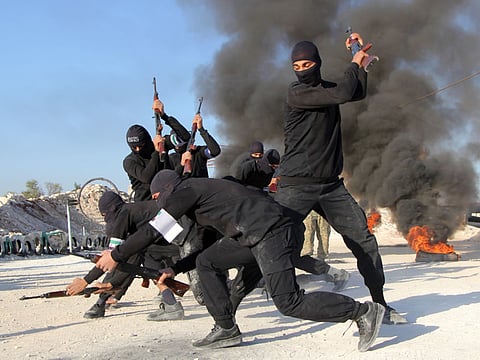A world caught between religion and revolution
People are the casualties as the world becomes poorer with terrorism rearing its ugly head

The elimination of the terrorist group Daesh [the self-proclaimed Islamic State of Iraq and the Levant] is not an easy job. Making the terror group a thing of the past is difficult, despite the losses it has incurred at the hands of the international coalition in Iraq and Syria. The inevitable defeat of Daesh, as a physical entity, will take some time as there are pockets in both the countries where these terrorists continue to exist.
In spite of what seems to be a victory, we must acknowledge that the world will continue to grapple with the group’s mindset and its many manifestations for some time. If the remaining terrorists, who fled battlefields, are not addressed, the remnants of Daesh will grow stronger and restore their strength. It must be tackled quickly and decisively. Otherwise, the international community’s efforts will come to nought.
Who would have imagined that the war-torn country, Afghanistan, would become one of the safe havens for Daesh remnants today? Daesh terrorists, who managed to reach Afghanistan, seem to have allied with the Taliban. Additionally, Daesh still exists in the form of lone wolves in Europe.
It seems that neither the Europeans nor the Arabs have understood the goals and messages of this satanic organisation. First, the Arabs hesitated to determine the magnitude of this group and decipher its intentions. Until today, neither the Arabs nor the Europeans have managed to eliminate terrorism conclusively. It is apparent that a battle of this magnitude and gravity will take many years. However, this battle will be defined by the international community’s intention, in addition to the possibilities on the ground and in the field.
Several questions linger over the emergence of Daesh. Where did Daesh come from? How did it suddenly become the beast that undermined security and stability around the world? Was the organisation born from the womb of Abu Musab Al Zarqawi’s group in Iraq, or is it a natural extension of Al Qaida, which was fuelled by the ideology of Muslim Brotherhood as represented by its leader, Ayman Al Zawahiri? Are there any specific parties, for pragmatic reasons, that helped Daesh become stronger and burn everything.
Perhaps no one has the answer, or whoever knows it does not want to answer. How and why do terrorist organisations appear out of the blue?
Poverty is one of the causes of terrorism. Of course, illiteracy and lack of education, or a misunderstanding of religion, or the feeling of injustice and persecution are also among the causes and motivations. Another motivating factor can be the tendency to reach one’s goals by any means, even if it is not ratified by constitutions. This is what is happening often in our world today. For example, former US secretary of state Hillary Clinton, who worked in the administration of former US president Barack Obama, had said in a lecture telecast by American television channels, that “The people we are fighting today, we found them”.
Hillary’s reasons may be attributed to the extension of Russia in Asia and Afghanistan specifically, referring to Taliban and Al Qaida. This is a viewpoint, but some have another explanation for the sudden emergence of terrorist organisations in the world. It is the absence of the Soviet Union on the global political stage after it was dismantled on December 26, 1991, marking the end of the Cold War between the two superpowers.
This left the US as the sole superpower in the world — a major political shift that had some disastrous consequences and repercussions on a number of countries. For example, the Afghan Taliban emerged in 1994, just three years after the collapse of the Soviet Union, and terrorism spread across the world.
The model of the tyrant is often repeated in today’s world, just like the military dictator. The first one rules people through his financial and real estate empires — just like the feudal person, while addressing his people in the name of religion.
The second one rules his people with an iron fist and addresses them in the name of revolution and change. As a result of the two models, people get caught between religion and revolution, while the world loses its humanitarian and cultural gains.
Mohammad Hassan Al Harbi is a renowned columnist and author whose writings cover various fields ranging from media studies to education.


